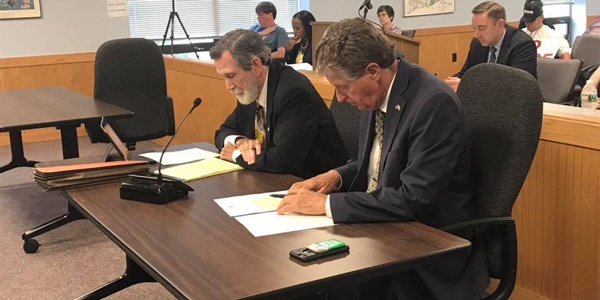By Peter Key
Although electric utilities will see their tax rate fall from 35% to 21% under the Tax Cut and Jobs Act signed by President Trump last month, few are making plans to spend their savings.
State officials across the country are calling for utilities to pass the savings to their ratepayers, and some utilities already have said they will.
The Organization of PJM States Inc. (OPSI) said in a letter to FERC that it has “unanimously and continuously advanced the need to ensure cost containment in transmission rates, which should directly benefit ratepayers.”
“The large reduction in the corporate tax rate effective Jan. 1, 2018, provides an opportunity to reduce rates to customers,” OPSI said in its letter. “While the commission examines whether the tax changes will impact FERC accounting forms/procedures and how these changes might affect transmission formula rates in PJM, OPSI unanimously supports all efforts by the commission to flow this cost reduction back to consumers.”
Of the 14 utility regulatory commissions in OPSI, at least three (Kentucky, Michigan and West Virginia) have started proceedings related to the tax bill, and at least one other (Indiana) is evaluating how the bill will affect utilities.
In Delaware, more than two dozen General Assembly members have sent the Public Service Commission a letter saying it should grant “in its entirety” a petition filed by the Division of the Public Advocate that utilities should pass their tax savings on to ratepayers.
Regulatory bodies have opened proceedings or taken other actions related to the tax bill in at least eight states outside PJM — Connecticut, Louisiana, Michigan, Minnesota, Missouri, Montana, Oklahoma and South Dakota.
In Oklahoma, the Corporation Commission’s administrative law judges have recommended that utilities pass the savings along to their customers. South Dakota’s Public Utility Commission has determined that investor-owned power and natural gas utilities should share the savings from the tax bill with customers.
Regulators have opened proceedings in Connecticut and Missouri, while the Louisiana Public Service Commission is reviewing utilities’ rates to see if they can be cut in light of the bill. The Michigan Public Service Commission ordered utilities to study the tax cuts’ impact and how they will pass the savings along to consumers. The Minnesota Public Utilities Commission plans to analyze how the law affects utilities and said it could undertake proceedings based on its findings. And the Montana Public Service Commission ordered utilities to calculate the change in their tax liabilities and come up with proposals for applying their savings.
In at least two other states, elected officials have called on regulators to take action.
Massachusetts Attorney General Maura Healey asked the Department of Public Utilities to recalculate rate increases it had granted Eversource Energy in November. The company responded by saying it would pass on almost $56 million in savings from the tax bill to its 1.4 million customers in the state. That inspired Rhode Island Lt. Gov. Dan McKee to send his state’s Public Utilities Commission a letter saying National Grid should use its savings to lower its rates.
In New Hampshire, Consumer Advocate Maurice Kreis filed a complaint with the Public Utilities Commission to make sure the savings that the state’s 13 IOUs realize from the tax bill flow back to their customers.
In some states, utilities are taking it upon themselves to proclaim they’ll pass their savings from the tax bill on to ratepayers. The Edison Electric Institute called the tax bill “a huge win for customers as the drop in the corporate rate is mostly flowed back to them over time in rates.”
In Maryland, Exelon’s Baltimore Gas and Electric, Pepco and Delmarva Power subsidiaries said they intended to file requests with the Public Service Commission to cut their rates.
In Illinois, Commonwealth Edison, also an Exelon subsidiary, asked the Commerce Commission for approval to pass along approximately $200 million in tax savings to its customers this year.
In Utah, Rocky Mountain Power said it will pass the benefits of the tax bill on to customers, though it wouldn’t commit to doing so by cutting rates.
And in Oregon, the Public Utility Commission said four electric and gas utilities had applied with it to track the tax bill’s impacts so they could be accounted for in ratemaking, and two other utilities are expected to join.






